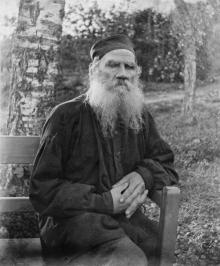- Home
- graf Leo Tolstoy
Sevastopol Page 21
Sevastopol Read online
Page 21
taken part, as to the causes of failure, of which each onegave his own impressions and ideas, and held his tongue as soon asthe battery commander himself began to speak; then the conversationnaturally changed to the insufficiency of calibre of the light guns,and upon the new lightened cannons, in which connection Volodya had anopportunity to display his knowledge of artillery.
But their talk did not dwell upon the present terrible position ofSevastopol, as though each of them had meditated too much on thatsubject to allude to it again. In the same way, to Volodya's greatamazement and disappointment, not a word was said about the dutiesof the service which he was to fulfil, just as though he had come toSevastopol merely for the purpose of telling about the new cannon anddining with the commander of the battery.
While they were at dinner, a bomb fell not far from the house in whichthey were seated. The walls and the floor trembled, as though in anearthquake, and the window was obscured with the smoke of the powder.
"You did not see anything of this sort in Petersburg, I fancy; butthese surprises often take place here," said the battery commander.
"Look out, Vlang, and see where it burst."
Vlang looked, and reported that it had burst on the square, and thenthere was nothing more said about the bomb.
Just before the end of the dinner, an old man, the clerk of thebattery, entered the room, with three sealed envelopes, and handed themto the commander.
"This is very important; a messenger has this moment brought these fromthe chief of the artillery."
All the officers gazed, with impatient curiosity, at the commander'spractised fingers as they broke the seal of the envelope and drew forththe _very important_ paper. "What can it be?" each one asked himself.
It might be that they were to march out of Sevastopol for a rest, itmight be an order for the whole battery to betake themselves to thebastions.
"Again!" said the commander, flinging the paper angrily on the table.
"What's it about, Apollon Sergieitch?" inquired the eldest officer.
"An officer and crew are required for a mortar battery over yonder,and I have only four officers, and there is not a full gun-crew inthe line," growled the commander: "and here more are demanded of me.But some one must go, gentlemen," he said, after a brief pause: "theorder requires him to be at the barrier at seven o'clock.... Send thesergeant! Who is to go, gentlemen? decide," he repeated.
"Well, here's one who has never been yet," said Tchernovitzky, pointingto Volodya. The commander of the battery made no reply.
"Yes, I should like to go," said Volodya, as he felt the cold sweatstart out on his back and neck.
"No; why should you? There's no occasion!" broke in the captain. "Ofcourse, no one will refuse, but neither is it proper to ask any one;but if Apollon Sergieitch will permit us, we will draw lots, as we didonce before."
All agreed to this. Kraut cut some paper into bits, folded them up, anddropped them into a cap. The captain jested, and even plucked up theaudacity, on this occasion, to ask the colonel for wine, to keep uptheir courage, he said. Dyadenko sat in gloomy silence, Volodya smiledat something or other, Tchernovitzky declared that it would infalliblyfall to him, Kraut was perfectly composed.
Volodya was allowed to draw first; he took one slip, which was ratherlong, but it immediately occurred to him to change it; he took another,which was smaller and thinner, unfolded it, and read on it, "I go."
"It has fallen to me," he said, with a sigh.
"Well, God be with you. You will get your baptism of fire at once,"said the commander of the battery, gazing at the perturbed countenanceof the ensign with a kindly smile; "but you must get there as speedilyas possible. And, to make it more cheerful for you, Vlang shall go withyou as gun-sergeant."
XX.
Vlang was exceedingly well pleased with the duty assigned to him, andran hastily to make his preparations, and, when he was dressed, he wentto the assistance of Volodya, and tried to persuade the latter to takehis cot and fur coat with him, and some old "Annals of the Country,"and a spirit-lamp coffee-pot, and other useless things. The captainadvised Volodya to read up his "Manual,"[L] first, about mortar-firing,and immediately to copy the tables out of it.
[L] "Manual for Artillery Officers," by Bezak.
Volodya set about this at once, and, to his amazement and delight, heperceived that, though he was still somewhat troubled with a sensationof fear of danger, and still more lest he should turn out a coward, yetit was far from being to that degree to which it had affected him onthe preceding evening. The reason for this lay partly in the daylightand in active occupation, and partly, principally, also, in the factthat fear and all powerful emotions cannot long continue with the sameintensity. In a word, he had already succeeded in recovering from histerror.
At seven o'clock, just as the sun had begun to hide itself behind theNikolaevsky barracks, the sergeant came to him, and announced that themen were ready and waiting for him.
"I have given the list to Vlang_a_. You will please to ask him for it,Your Honor!" said he.
Twenty artillery-men, with side-arms, but without loading-tools, werestanding at the corner of the house. Volodya and the yunker stepped upto them.
"Shall I make them a little speech, or shall I simply say, 'Good day,children!' or shall I say nothing at all?" thought he. "And why shouldI not say, 'Good day, children!' Why, I ought to say that much!" And heshouted boldly, in his ringing voice:--
"Good day, children!"
The soldiers responded cheerfully. The fresh, young voice soundedpleasant in the ears of all. Volodya marched vigorously at their head,in front of the soldiers, and, although his heart beat as if he had runseveral versts at the top of his speed, his step was light and hiscountenance cheerful.
On arriving at the Malakoff mound, and climbing the slope, heperceived that Vlang, who had not lagged a single pace behind him,and who had appeared such a valiant fellow at home in the house, keptconstantly swerving to one side, and ducking his head, as though allthe cannon-balls and bombs, which whizzed by very frequently in thatlocality, were flying straight at him. Some of the soldiers did thesame, and the faces of the majority of them betrayed, if not fear, atleast anxiety. This circumstance put the finishing touch to Volodya'scomposure and encouraged him finally.
"So here I am also on the Malakoff mound, which I imagined to be athousand times more terrible! And I can walk along without ducking myhead before the bombs, and am far less terrified than the rest! So Iam not a coward, after all?" he thought with delight, and even with asomewhat enthusiastic self-sufficiency.
But this feeling was soon shaken by a spectacle upon which he stumbledin the twilight, on the Kornilovsky battery, in his search for thecommander of the bastion. Four sailors standing near the breastworkswere holding the bloody body of a man, without shoes or coat, by itsarms and legs, and staggering as they tried to fling it over theramparts.
(On the second day of the bombardment, it had been found impossible,in some localities, to carry off the corpses from the bastions, and sothey were flung into the trench, in order that they might not impedeaction in the batteries.)
Volodya stood petrified for a moment, as he saw the corpse waver onthe summit of the breastworks, and then roll down into the ditch;but, luckily for him, the commander of the bastion met him there,communicated his orders, and furnished him with a guide to the batteryand to the bomb-proofs designated for his service. We will notenumerate the remaining dangers and disenchantments which our herounderwent that evening: how, instead of the firing, such as he had seenon the Volkoff field, according to the rules of accuracy and precision,which he had expected to find here, he found two cracked mortars, oneof which had been crushed by a cannon-ball in the muzzle, while theother stood upon the splinters of a ruined platform; how he could notobtain any workmen until the following morning in order to repair theplatform; how not a single charge was of the weight prescribed in the"Manual;" how two soldiers of his command were wounded, and how he wastwenty times within a hair's-breadth o
f death.
Fortunately, there had been assigned for his assistant a gun-captainof gigantic size, a sailor, who had served on the mortars since thebeginning of the siege, and who convinced him of the practicability ofusing them, conducted him all over the bastion, with a lantern, duringthe night, exactly as though it had been his own kitchen-garden, andwho promised to put everything in proper shape on the morrow.
The bomb-proof to which his guide conducted him was excavated in therocky soil, and consisted of a long hole, two cubic fathoms in extent,covered with oaken planks an arshin in thickness. Here he took up hispost, with all his soldiers. Vlang was the first, when he caught sightof the little door, twenty-eight inches high, of the bomb-proof, torush headlong into it, in front of them all, and, after nearly crackinghis skull on the stone

 Anna Karenina
Anna Karenina Sevastopol
Sevastopol The Cossacks: A Tale of 1852
The Cossacks: A Tale of 1852 The Kingdom of God Is Within You
The Kingdom of God Is Within You